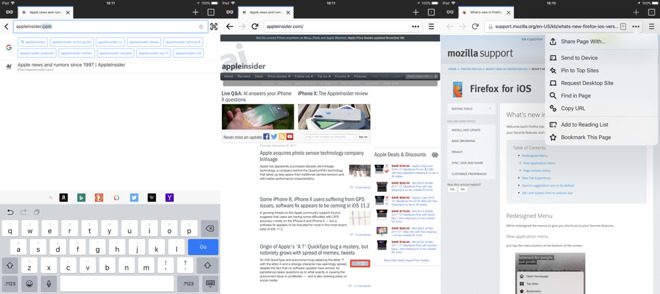Firefox has updated the iOS version of its browser to version 10.0, with the milestone release featuring a refreshed modern interface and changes to the menu system, ahead of another major update arriving on the desktop version of the browser next week.

The latest edition of Firefox for iOS adopts what Mozilla calls the "Photon" design, a modern and minimalist appearance that makes it easier to access the browser's menu. The menu button located at the bottom of the screen on the iPhone, top on iPad, brings up a short list of essential shortcuts, including the reading list, bookmarks, history, and options to enable night mode and to hide images.
The page action menu in the address bar offers a few more options aimed at sharing and storing content for later viewing. Aside from triggering the sharing options, the menu can be used to pin pages to the Top Sites section, send a page to the browser on another device, and to add the page to the user's reading list.
Mozilla has also changed the way content appears when a new tab is created, with a list of top sites accompanied by previously visited and bookmarked pages, and popular articles from Pocket.
For searches, Firefox will provide popular search suggestions by default, popping up the list of potential searches below the address bar. The QR code reader has been relocated to the right of the address bar, to make it easier to access.
Lastly, there is also a "No Image" mode that can block all images from loading within the browser, potentially saving the user's data allowance from being overused and opening up available bandwidth in a low-coverage area.
Firefox for iOS version 10.0 is 98.5 megabytes in size and is compatible with iPhones, iPads, and the iPod touch running iOS 10.3 or later.
The update to the iOS version takes place shortly before a similar refresh for the desktop version of Firefox, launching on November 14. Version 57, codenamed "Quantum," will be focused on improving the performance of the browser, with Mozilla claiming its new engine is twice as fast as versions released in 2016 while using 30 percent less memory than Chrome.


